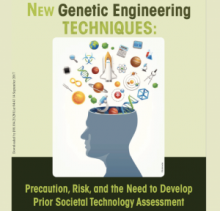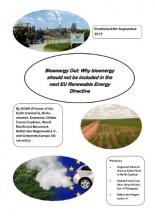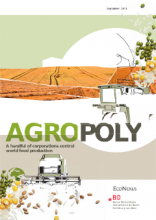Synthetic Biology
Gene Drives
Synthetic gene drives are a new form of genetic engineering that aims to rapidly force genetic changes into entire populations of wild species. This is done by overriding the normal rules of (Mendelian) genetic inheritance. In most proposed applications, the aim would be to suppress or eliminate wild populations by spreading infertility or altering sex ratios. Other researchers propose using the technology to genetically modify species in the wild to change their characteristics.
New Genetic Engineering Techniques: Precaution, Risk, and the Need to Develop Prior Societal Technology Assessment
'Climate-Smart Agriculture' - preparing for a corporate soil and climate-grab in Paris?
This article gives a brief history of ‘Climate Smart Agriculture’, and shows how currently the term can equally be applied to both industrial monocultures and agroecology. The level of corporate interest is high, including Monsanto, Walmart, Danone, and the big fertiliser companies. France, a keen member of the Global Alliance for ‘Climate-Smart Agriculture’ (GACSA), and the host for December 2015 climate conference in Paris (COP21), has developed a proposal that risks defining the soil as a giant carbon sink to offset continued emissions.
Dr Frances Kelsey: thalidomide and the precautionary principle
"The case of thalidomide shows how vital it is not to ignore early warning signals or be hurried into premature approvals of innovations, with serious and often irreversible consequences at a later date."
We owe a deep debt of gratitude to Dr Frances Kelsey, write Helena Paul & Philip Bereano. In 1960, she defied her bosses at the FDA to prevent the licensing of thalidomide in the USA, saving thousands from being born with serious deformities. Her tough approach to minimising the risk from new drugs contains lessons we ignore at our peril.
Bioenergy Out: Why bioenergy should not be included in the next EU Renewable Energy Directive
Renewable energy legislation such as the EU Renewable Energy Directive (RED) aims to significantly scale up forms of energy classed as renewable, with the stated aim of reducing greenhouse gas emissions. There has been a lack of critical debate about the definition of renewable energy to date. According to the International Energy Agency, renewable energy is "energy derived from natural processes (e.g. sunlight and wind) that are replenished at a faster rate than they are consumed". Large-scale industrial bioenergy does not meet this definition because it relies on a major expansion of industrial agriculture, monoculture tree plantations, and industrial logging, which deplete and pollute soils and water, destroy natural ecosystems and biodiversity, and destroy the livelihoods of many millions of people, particularly in the global South. Furthermore, large-scale industrial bioenergy cannot meet the EU’s stated aim of reducing emissions of greenhouse gases (GHG) because it leads to emissions of carbon and other greenhouse gases that are commonly greater than those from the use of fossil fuels. Nevertheless, within the EU's overall renewable energy target, bioenergy competes with more sustainable and climate-friendly renewable energy rather than with fossil fuels. This briefing makes the case for taking bioenergy out the new EU Renewable Energy Directive for 2020-230.
Genetic Engineering in Plants and the “New Breeding Techniques (NBTs)”
Over the last 5-10 years there have been rapid developments in genetic engineering techniques (genetic modification). Along with these has come the increasing ability to make deeper and more complex changes in the genetic makeup and metabolic pathways of living organisms. This has led to the emergence of two new fields of genetic engineering that overlap with each other: synthetic biology and the so-called New Breeding Techniques (NBTs).
AGROPOLY - A handful of corporations control world food production
In just 18 pages, Agropoly shows how a handful of companies have come to dominate the agro-industries for:
New breeding techniques
In the interest of protecting the environment and public health, genetically modified crops are subject to risk assessment, an authorisation process and labelling rules under EU law. All non-traditional breeding processes that change the structure of DNA using genetic engineering technologies or interfere with gene regulation fall within the scope of these GM regulations. Some are now calling on the European Commission to exempt new genetic engineering techniques from GM rules. The undersigned groups argue that such an exception could threaten the environment and our health, and would violate EU law.




